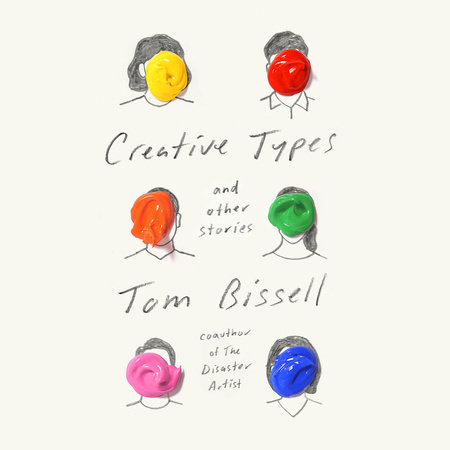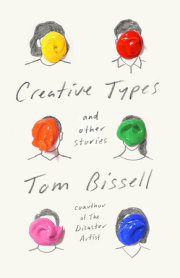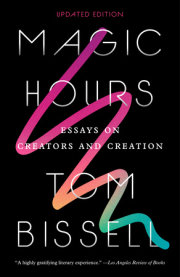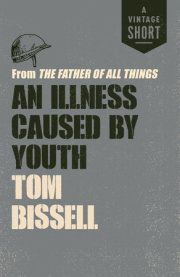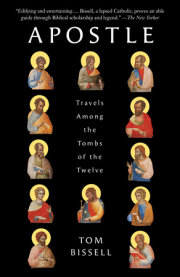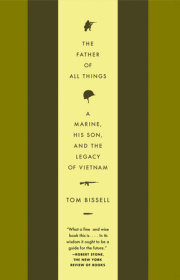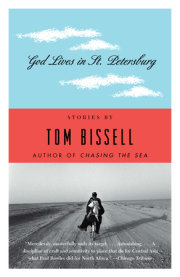CREATIVE TYPES
The night before their appointment, they sent Haley one final email in which they reaffirmed the when and where and tastefully restated their excitement. But Reuben managed to smuggle in a request: Would Haley mind wearing “normal clothes”? He was about to hit Send when Brenna, proofreading over his shoulder, announced that his use of
normal was, in this context, “problematic.”
“Problematic,” he said. Their son had been asleep for an hour.
Bren, looking at the laptop’s screen, only nodded.
Reuben poised his email-sending finger above the Enter key like a scientist about to launch something toward Pluto. “Bren, come on. I’m sending it.”
Bren paid this no attention at all, probably because she knew he wouldn’t send it, not without her go-ahead
. “
Normal. It just seems like a very classist thing to write. Normal to
whom?”
For as long as he’d known her, Bren had worried about classism. These days, of course, he and Bren were doing well, perhaps even embarrassingly well. However, their many years of doing less well had made Bren afraid of succumbing to the thoughtless consumption patterns of their friends, such as Annabelle and Isaac, who recently built a thirteen-thousand- dollar outdoor pizza oven with imported Umbrian stone. To Bren’s way of thinking, success, particularly Hollywood success, was mostly an accident; she never wanted to condescend to those who hadn’t been as lucky as she. But this meant that virtually everything Reuben said to servers and valets was later subjected to Bren’s undergrad-Marxism rhetorical analysis. He didn’t mind. If anything, he admired her for it. When Annabelle and Isaac whipped up their first batch of pizzas, everyone politely chewed and smiled on their sunlit patio. Bren was the first person to actually say, “Is it me or is this not very good?”
Reuben kicked back in his chair. “Well,” he said, “you know what you’re assuming, right?”
Bren looked at him. “What am I assuming?”
“You’re assuming a woman in her line of work is automatically of a lower class.”
“I am not.” But as Bren thought about it, as he knew she would, her face fell. “Oh God. I am.”
“And given her rates, I’d say that’s a pretty dubious assumption, frankly.”
Bren nevertheless convinced Reuben to put
normal clothes in scare quotes, so “We’d appreciate it if you wore normal clothes (neighbors!)” became “We’d appreciate it if you wore ‘normal clothes’ (neighbors!)” Minutes after his no longer—or at least somewhat less—problematic email finally went out, Bren was rereading it on her phone. (She’d been cc’d.) “A
lot going on in that sentence,” she said unhappily. Haley’s response came ten minutes later: emoji thumbs-up, emoji rose, emoji kiss.
Haley arrived the next night in a plain black circle skirt and kimonoish green blouse. She looked like the hostess of the type of sushi bar that had Mexican sushi chefs, so the outfit was normal enough, and already Reuben had a good feeling about how the night was going to go. This good feeling grew apace when Haley wrapped him up in a big tight hug. “It’s so nice to see you again!” Haley said, her neck warm with spice and citrus, her hair a cascade of coconut, her clothes all powdered lavender. Reuben’s hands were on Haley’s back. They felt good there. They fit. Her blouse was satin, gem green, smooth and slick and glossy. Hugging Haley was like lying in a strange bed you didn’t want to get out of. Then, beneath his hands, Haley’s shoulder blades flexed; their hug was ending. Reuben stepped away, closed the door, and turned to see Bren standing in the long entryway hall, clasping her enormous wineglass by its stem. Haley moved toward her.
“Oh!” Bren said, as though Haley were a dirty-pawed puppy about to jump into her lap. “Okay! Hello!” While they embraced, Bren held her wineglass—a festive red orb of Malbec—up above her and Haley’s heads, which somehow made Reuben think of mistletoe. His hands had been respectfully stationary on Haley’s body, but Bren’s free hand moved familiarly up and down Haley’s back. That was one great sociocultural advantage of women’s hands, wasn’t it? They could go where they wanted to go. They had free rein.
Haley released Bren, after which she took up a position in the front hall that allowed her to look at both Bren and him simultaneously. She obviously wasn’t in the habit of putting her back to people she didn’t know well, and for that he blamed her not a bit. No one said anything for a moment. They were all smiling like naughty children.
“It’s nice to see
you again,” Reuben said finally.
Haley laughed. “Ah. That. So when I arrive, I always say, ‘Nice to see you again,’ even if it’s my first time somewhere.”
At this point Reuben realized that Haley was subtly chewing gum. She had nice lips, and nice everything else, at least as far as he could tell. He wondered if he’d get to kiss her tonight. He and Bren had worked out some ground rules for what he could and couldn’t do to Haley, but when it came to kissing, Bren was conflicted. It depended, she said, on how everything felt in the moment. What doesn’t?
#
Copyright © 2020 by Tom Bissell. All rights reserved. No part of this excerpt may be reproduced or reprinted without permission in writing from the publisher.

